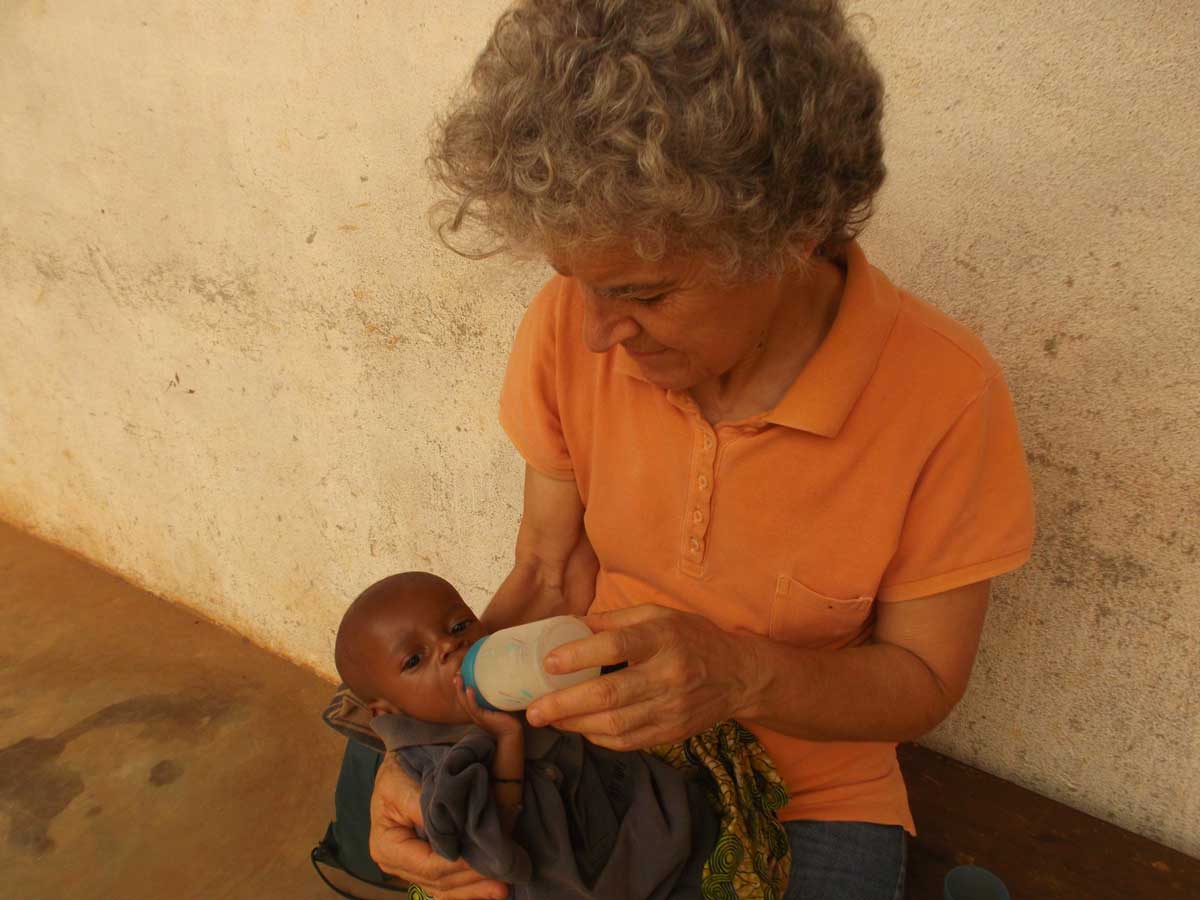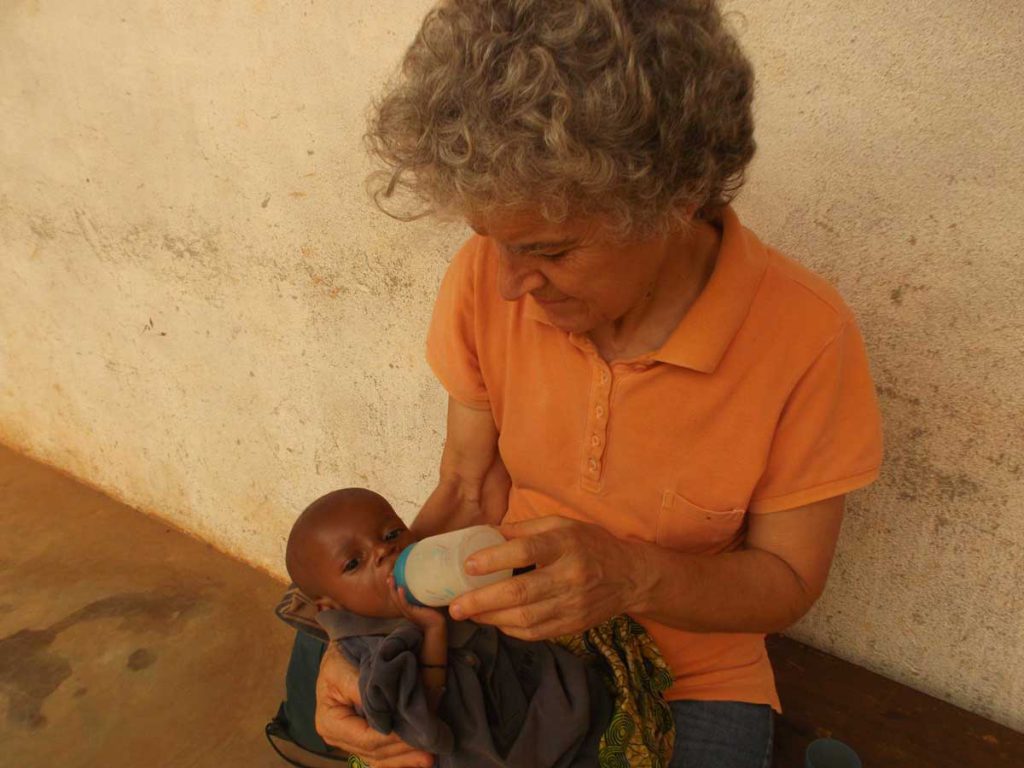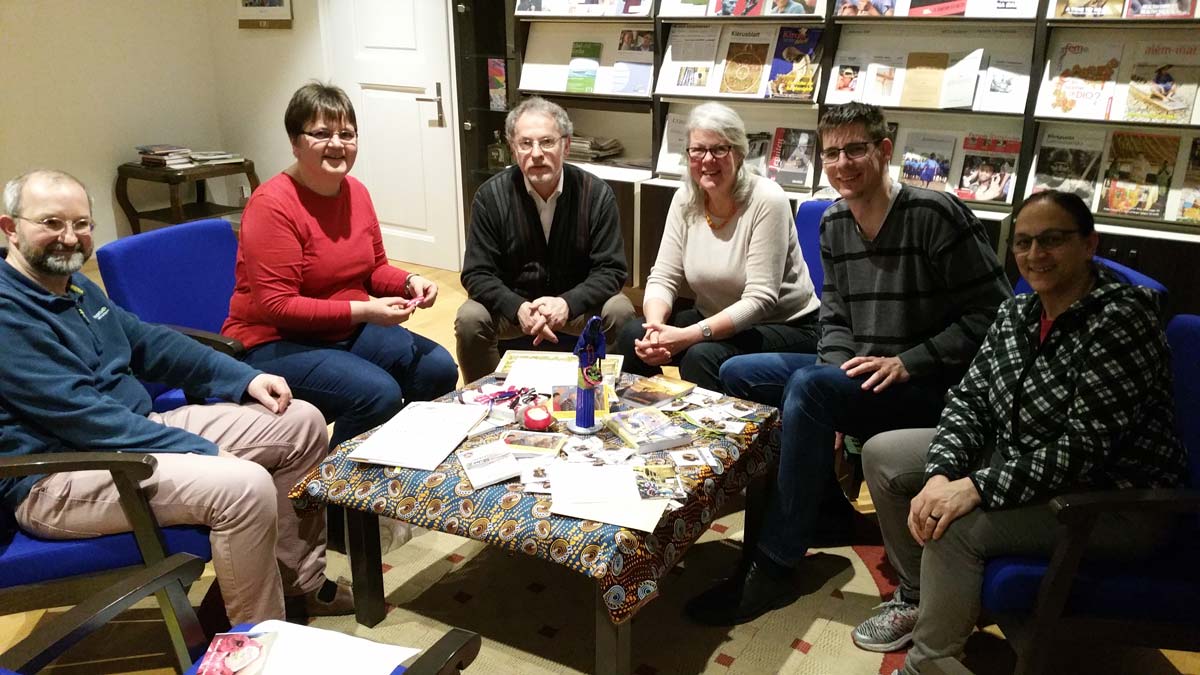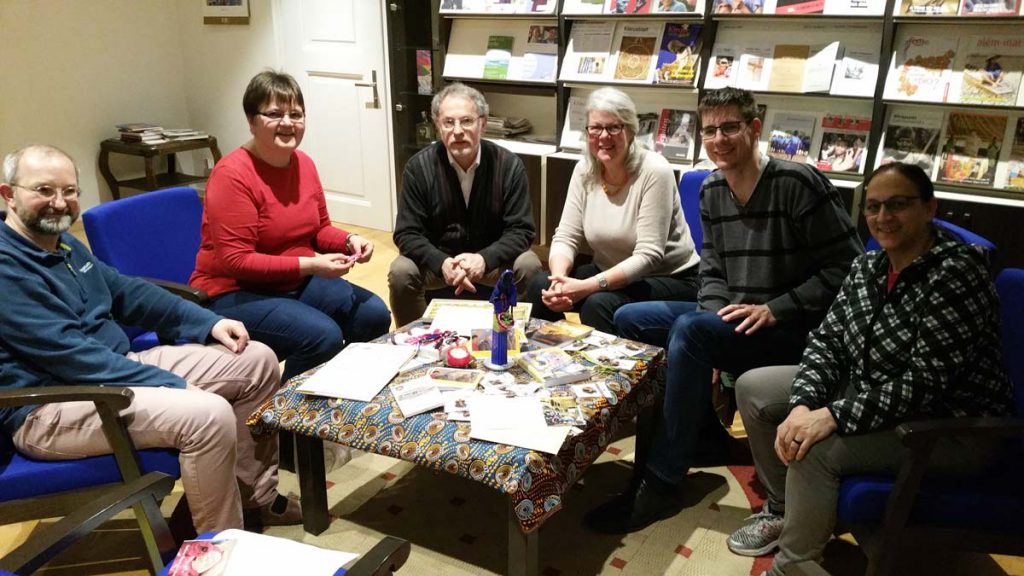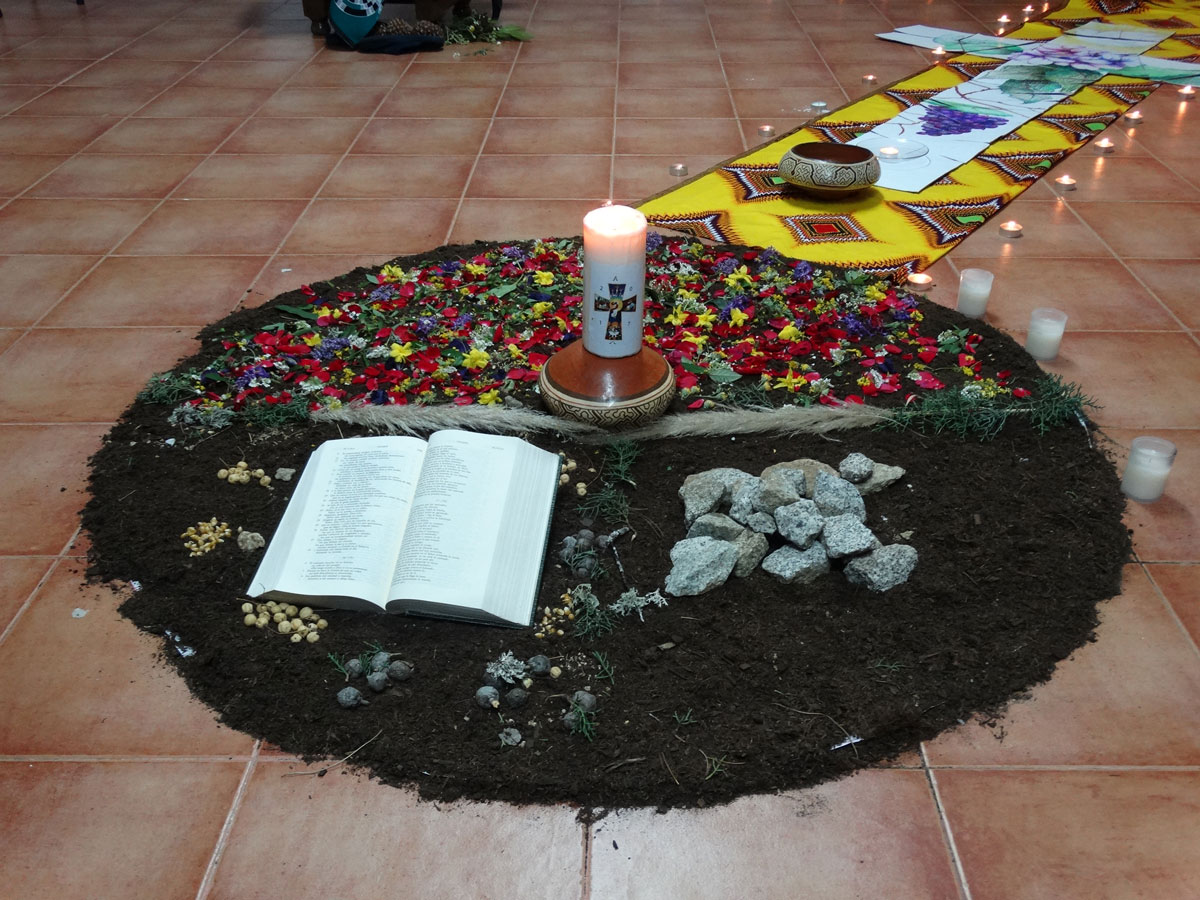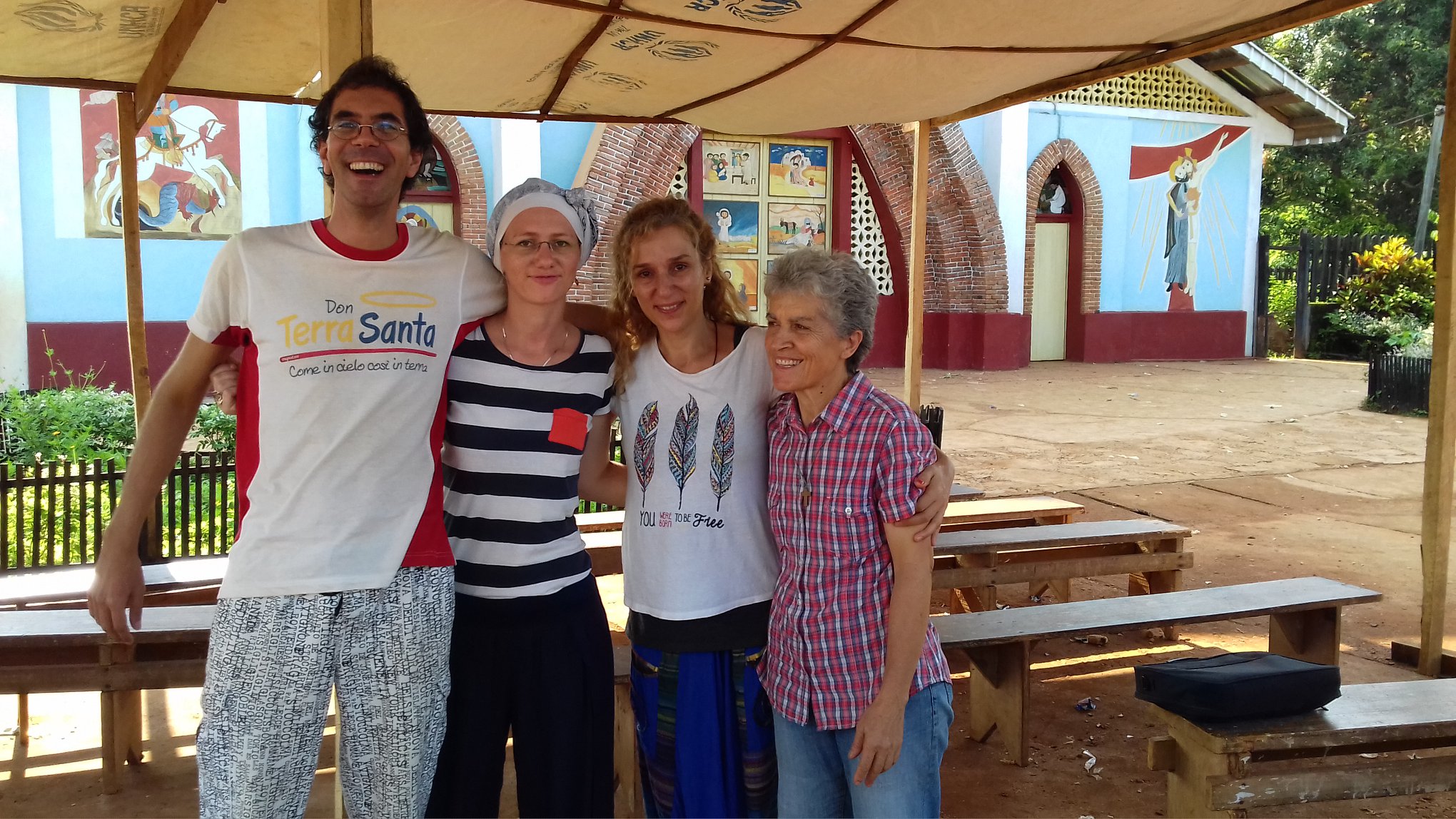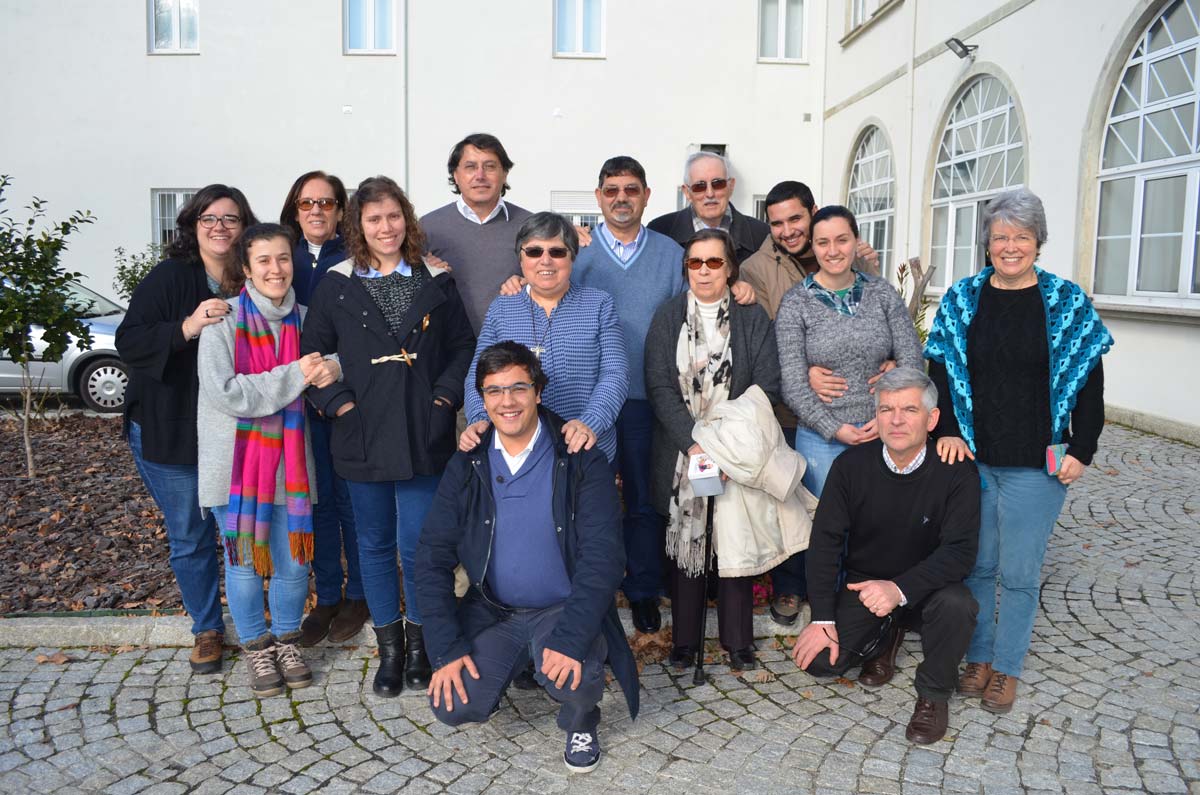“Here I am sending you some tidbits on mission life.” With these words our dear friend María Augusta embraces us and writes on what is going on in the mission of the CAR. Ana [CLM from Poland] had a problem with an elbow. X-rays were taken and then we went with her to the military medical center in Bangui. People there were very kind and helpful. God willing, we will have lunch with them tomorrow. Gratefully, the rest of us is doing well. We had news from Fr. Samuel, who is also doing well, taking advantage of his vacation to rest and to visit family and friends. This week a mother with twin girls came to us. She had already been here other times to ask for milk, because she did not have enough for both babies. They were already undernourished. We took care of them and they had returned home in good shape. Now she came with one of the babies being very skinny, and weighing only 2 Kg at 9 months… I was very stressed by it and immediately I went with the mother to the place where we treat those who are undernourished, to have her admitted. I do not know whether she is going to make it! May the Lord do what is best for her. Little Andrés, the orphan I met in November 2015 and to whom we gave milk, has Pott disease (vertebral tuberculosis). He was taken to the pediatrician in Bangui and now he is being treated for it. Later he will undergo surgery like Gervelais*, who up to this point was not able to walk, but after two months of this TB treatment, has already started to take a few steps and it is clear he has a lot of inner strength to make him want to learn how to walk in a hurry. At the school we have started two remedial classes** of 90 minutes each, twice a week. In the early years we concentrate on reading and writing. And then later we add Mathematics. May the Lord give our students strength and good will so as not to fail, but may improve their chances. By God’s grace we have some students with a lot of will power… this is what gives us the encouragement to continue. We are grateful to the Lord who gives us good health, happiness and the will to keep on with it. I wish all of you a Lent filled with Quiet and Growth in the love of God and our brothers and sisters. Always united in prayer and mission! Thanks for your prayers. María Augusta Pires, CLM in CAR * Gervelais is the name of a “little one” María Augusta referred to earlier on April 13 and June 11, 2018. ** Because the results of the students are not encouraging, as she explained in her last letter.
Europe
CLM Meeting in Nurember
The richness of the CLM groups is their variety
With still great vigor and enthusiasm Christoph, Fr. Günter and Barbara told us of how they experienced the general assembly of the CLM in Rome. It was great to be present and meet the CLM of the other 19 countries/provinces, to share and to pray together, to discover what is most useful in our future development and what steps are necessary or possible. The difference between the groups is great and it is at one and the same time a challenge and an enrichment. To be able to keep in touch by way of WhatsApp is marvelous. Barbara gave us a first introduction to the proposals of the assembly and then the group started examining the steps/decisions most important to us.
Pilgrimage of the CLM and the MCCJ
Bro. Hans, Fr. Günther and Willi gave us information over the pilgrimage we will have this coming September. Concrete proposals were made and have decided on the main points. There is room for 18 participants, registrations can be placed with Willi (CLM) or with Fr. Günther (MCCJ). After lunch we had enough time to enjoy the sunshine and walk around the lake of Wörther See.
Africa – A continent of Peace Initiatives
We gave a good amount of time to the continuation of our work connected to our peace project. The next step will be Bro. Hans’ conference at the peace center of Lindau. Together we prepared for him the basic idea and the methodology to be followed. The lecture will introduce the valuable experiences of the continent connected to activities of peace and reconciliation. The CLM will contribute a “Network of Places of Peace” (we shared the work for him).
Dynamics connected to Globalization
Christof was our guide in a better understanding the pro-active pedagogy connected to themes such as globalization and peace.
Humans are meant for joy – joy is meant for humans
At the end of the day we reflected on a theme prepared by Franz von Sales on the “joy of our faith.” Joy is our Godly inheritance – the only one that can give us happiness. Joy has such a strong connection with our heart, that it cannot be at peace without it. God created joy for our own wellbeing. With joy, we await our next meeting in May (3-5).
All who are interested, are welcome!
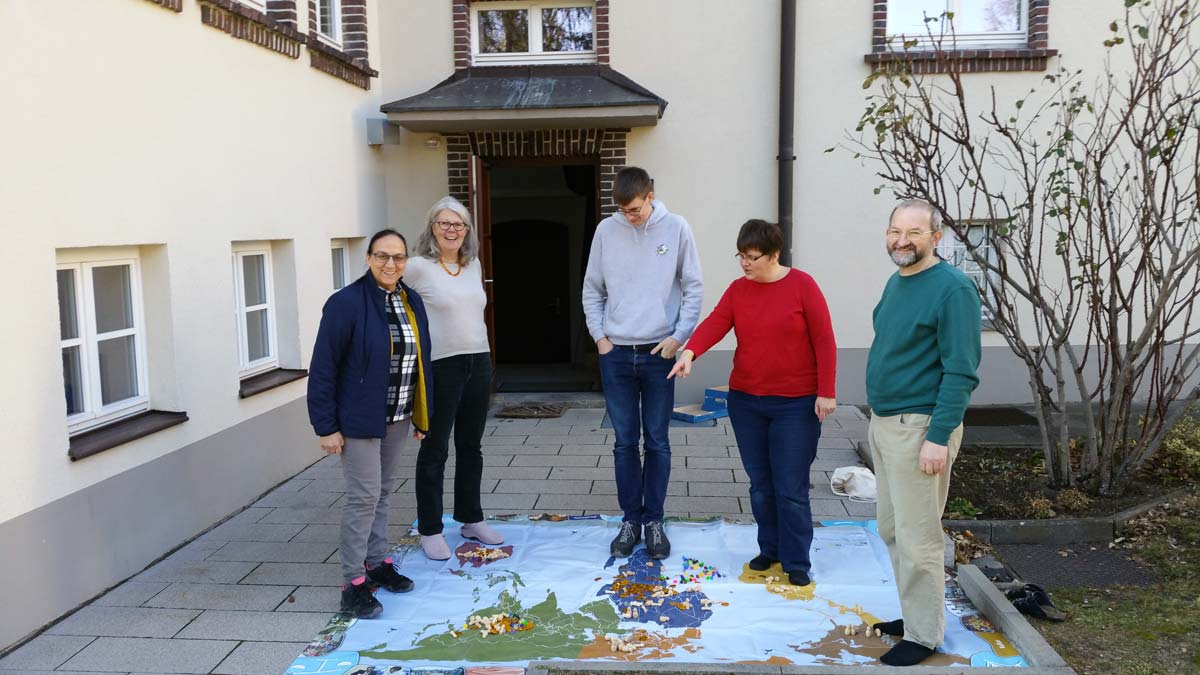
CLM, Germany
Prayer of the Comboni Family 2019 March
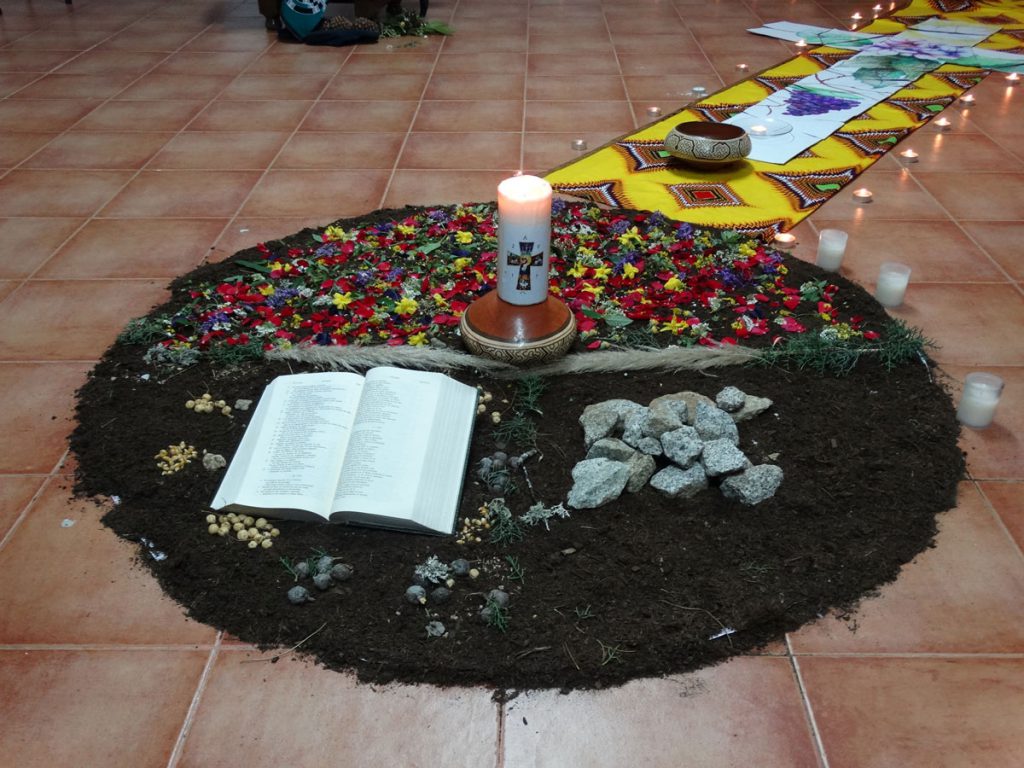
March – That the canonisation of Bishop Romero may bring all the Christian communities of Latin America strength, perseverance and confidence in the power of the Gospel. Lord hear us.
News from the Central African Republic –Astrolabio Newspaper
The CLM María Augusta writes from Mongoumba, CAR, for her parish paper – The Astrolabio.
Dear Fr. Orlando,
How are you? I hope the new year started very well and so it will be to the end. A happy 2019 to all the parishioners and to your family.
Last week I had malaria, but, by God’s help, I already recovered. The rest of the community is well.
Fr. Samuel left today for his vacation. We ask God that it be a good one and that he may return full of pep and courage to continue the mission entrusted to him.
On December 17 and 18 the Cardinal came to visit. The people of the parish were delighted! A large crowd gathered when he arrived… many people of other denominations also came. For the Eucharist the church was full, and lots of people were gathered outside as well. It lasted five hours! He spoke very eloquently on the problem of likundu* (witchcraft) and other problems.
Ana and Cristina were in Bangui and Simone was in Italy, and I was with the priests to receive him. With God’s help all went well! I hope people will put into practice what they heard. He visited the 10 parishes of the diocese. Ours was the one before the last. He ended his visitation in the cathedral of St. Jeanne of Arc, in Mbaiki. I know that he ended up being very tired, but happy with the participation he saw.
Last time we were in Bangui, at the supermarket we met a policeman from Janeiro da Cima (a place in Portugal). He said that he had already heard that there was around a missionary woman from Janeiro de Baixo (a neighboring place). It was great! He told us that there were soldiers stationed around the airport and yesterday we went to visit. They gave us a great and happy reception! They also gave us medical supplies and invited us to lunch. God willing, we will go tomorrow.
The results of our students are not encouraging and we hope they will improve during this quarter.
I know that you have seen and listened to many reports, none of them pleasant, about our poor country. By God’s grace, here we are at peace, but we mourn with our brothers who are being massacred!
We don’t know yet when we will return to Mongoumba…
Let us continue united in prayer.
A great missionary hug from all of us, to you and to all the readers of Astrolabio.
CLM Maria Augusta in Astrolabio
Year 5 – #139 – February 3, 2019
Parishes of Cabril, Dornelas do Zêzere, Fajão, Janeiro de Baixo, Machio, Pampilhosa da Serra, Portela do Fôjo, Unhais-o-Velho e Vidual
* The problem of likundu is that people are falsely accused of witchcraft and then they are brutally murdered.
Formation Meeting – “Comboni: God, the Cross and the Mission”
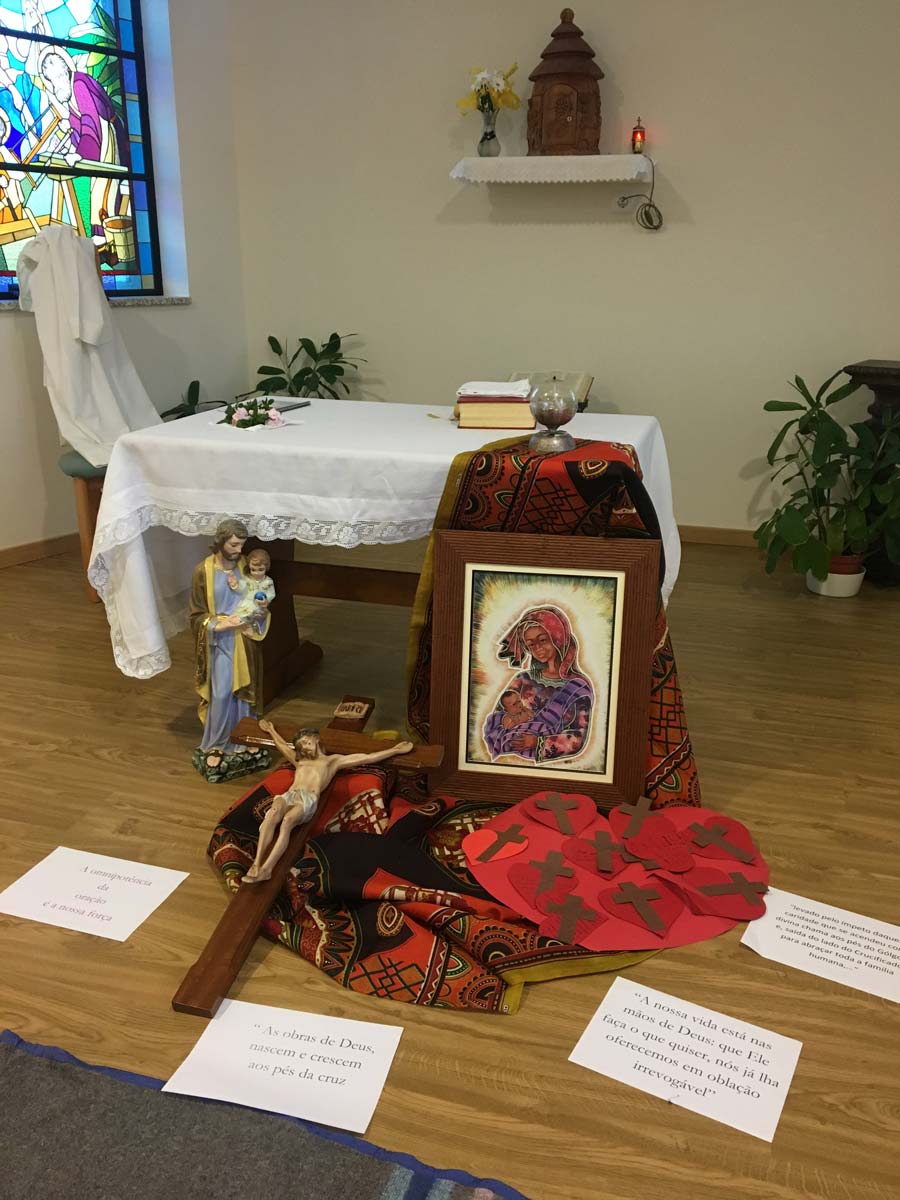 The 5th formation meeting of this year took place in Viseu on January 18-20. Comboni Sr. Carmo Ribeiro directed this weekend so full, so rich, so intense, on the theme “Comboni: God, the Cross and the Mission.”
The 5th formation meeting of this year took place in Viseu on January 18-20. Comboni Sr. Carmo Ribeiro directed this weekend so full, so rich, so intense, on the theme “Comboni: God, the Cross and the Mission.”
We started with something that I considered very relevant and that made me understand immediately that it was going to be a good weekend. Sr. Carmo started by giving us a slightly different and more complete title: “Comboni: God, the Heart of the Crucified Jesus, as the Good Shepherd, and the mission”. And from that we began to see the true greatness of Comboni and of his charism.
On Saturday we explored those that are and that have turned out to be the supporting pillars of God’s living presence in Comboni. First of all, Trust in God and the deep conviction that his life is from God. Comboni always made time for prayer, silence and, even in times of tribulation, he trusts completely and surrenders his life to the hands of God. Comboni’s vocation comes from there and he always makes recourse to him, he always lives in him and finds light for his path. This deep relationship fascinates me and shows me how far I still am from this commitment of life and this trust.
Secondly, the love of the Pierced Heart of the Good Shepherd gave identity to the Comboni charism. From this mystic experience of prayer rises this strong connection with the pierced heart of the Good Shepherd, and from this heart Comboni drank and drew strength and from here his vocation and his commitment to mission grew. This is the heart that shaped the life of Comboni and that should always shape ours. May we be capable of this trust and surrender.
Thirdly, the Love of the Cross, the cross that saves us. This conviction that the cross, suffering, difficulties, when embraced, are life-giving! Comboni experienced being insignificant, embraced the cross as his bride, and was saved by God, because of his Love.
Then comes the Cenacle of Apostles, namely, the community as the center where mission becomes reality in the context of its richness, fragility and difficulties, with what each member is and is capable of giving of oneself. It means to know that community begins with me and that our vulnerabilities cement our community more than our talents.
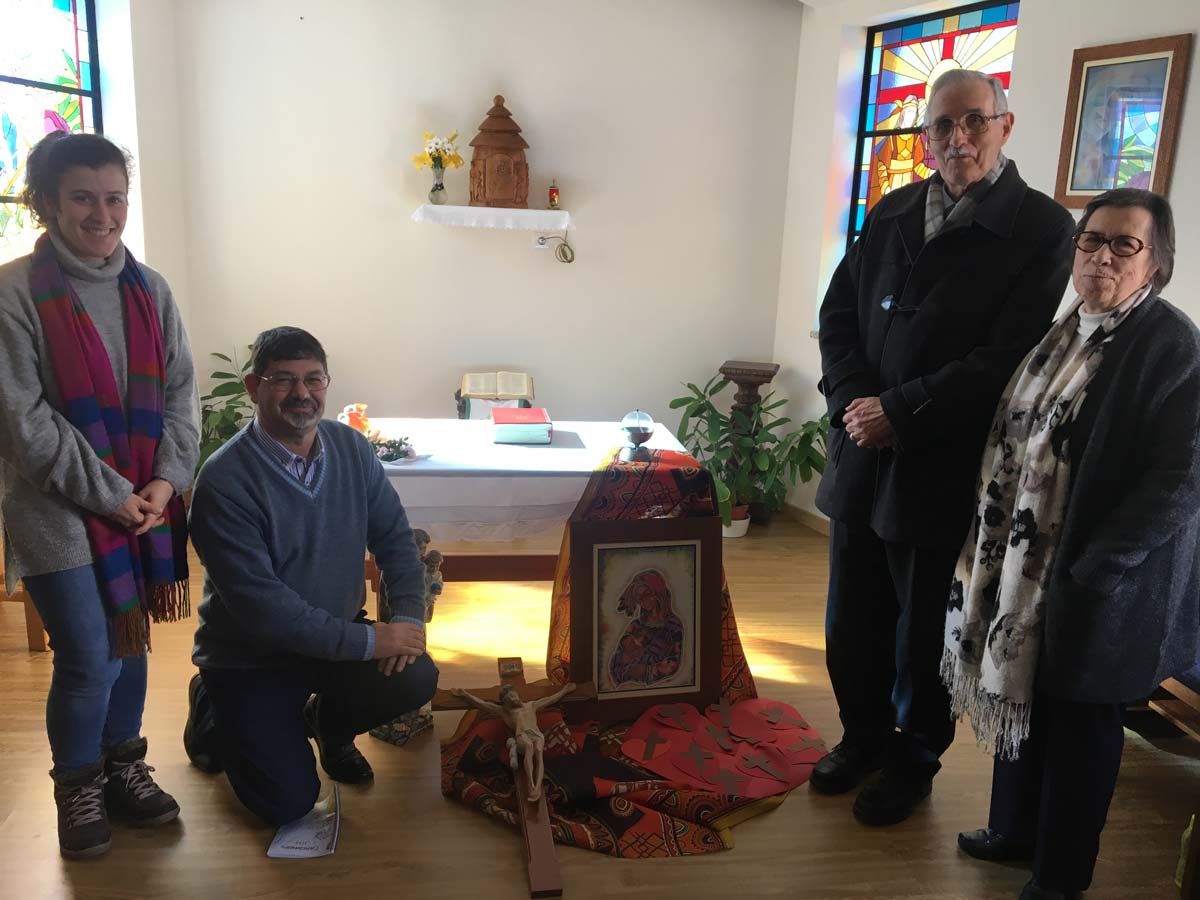 In the fifth place, Mary, as Mother of the Church and Mother of Africa, who prepared and then always followed her son Jesus, is also part of the cenacle. In Mary Comboni sees the mother of the Black race and the support of his missionaries. And it is in her that we, too, must look for our inspiration, help in our doubts, and place our lives in her hands.
In the fifth place, Mary, as Mother of the Church and Mother of Africa, who prepared and then always followed her son Jesus, is also part of the cenacle. In Mary Comboni sees the mother of the Black race and the support of his missionaries. And it is in her that we, too, must look for our inspiration, help in our doubts, and place our lives in her hands.
Then comes St. Joseph, another pillar of the Comboni charism, he who protected the great treasure, the best God had: Jesus and Mary. St. Joseph always protected and administered his God given goods who were never his own, in silence, right intention and care that they lack nothing.
It is also in prayer and zeal that we find the other pillar of Comboni’s life in God, the conviction of the importance and strength of constant prayer and the determination to always watch over and protect the mission.
Finally, and not less important is the feeling of being Church, of belonging, of being one with the others. Above all, was the obedience and respect for the decisions of the Church, without ever forgetting the mission God had given him in order to achieve the Plan for the Regeneration of Africa.
Well, above all I treasure in my heart all these pillars of Comboni, and I feel that I must have them in my life as well. It was a very intense day, filled with things shared and a lot of learning. We need to lift all of this in prayer so that the journey will shine with the life of Comboni.
We closed the afternoon with a prayer, a sign over joys and crosses, a community prayer, where I felt this cenacle described by Comboni, where our frailness, joys, crosses and fears were shared with Jesus and one another. It was an incisive prayer, intense where I was able to see the reflection of the face of Jesus.
In the evening we saw “Of God and Men,” About a community of monks in Algeria, who lived through the difficult decision of leaving or of staying with the people and the mission to which they had been assigned. It is a very harsh movie, full of life, about faith, community, dedication, mission… It deals with how the love of God becomes present in each one of them and with total donation within each one’s frailty. The film, in a way, helped us to visualize the Comboni style of life we had discussed during the day.
On Sunday we heard the witness of Sr. Conceição. I treasure in my heart her intensity in speaking about mission, the marvels worked by God in her mission place and the feeling of risking it all in the name of mission. This risking at times looks like pure madness, but always with that trust in Jesus and in Comboni.
Besides all this, that was a lot and very good, we enjoyed a very fortunate weekend, when we shared coffee at the Comboni Sisters’ house where we were so kind to us. We enjoyed the presence of Fr. Luís Filipe, who stayed with us the entire weekend sharing his witness and of Sr. Conceição who shared so much about herself with us.
We also had the joy of sharing the Eucharist with Artur Valente, Fr. Luís Filipe and Sr. Conceição and so, in a way, to commemorate the beginnings of the CLM.
I could continue to write about what I experienced, felt and learned during this weekend but above all there is the certainty that Comboni’s life was intense, impacting, and that his faith led him along the most beautiful paths of life and of mission.
May I assimilate all this learning and pray to God to guide my way.




